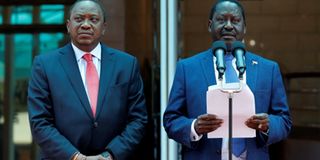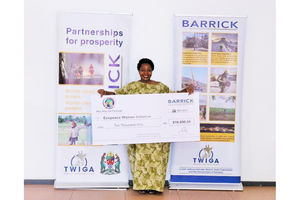Tanzania loses East Africa’s higher freedom rank to Kenya

President Uhuru Kenyatta and opposition leader Raila Odinga
Dar es Saam. Tanzania has lost its ranking as the most free democracy in the region to Kenya, and its reputation is now seen as rivalling politically hotspots around the world, a new report shows.
Dar has dropped by seven places over the last one year, scoring 45 aggregate score points as opposed to 52 points in the previous study which had ranked it better of all the six members of the East Africa Community (EAC). But the ‘Freedom in the World Report 2019’ released Friday shows that Kenya – with a score of 48 points, is now the leader in political freedom in EAC. Kenya scored the same points in the 2018 report.
According to the report, Burundi (18 points) is the least politically free, followed by Rwanda (23) and Uganda (37). However, despite the different scores, Tanzania and Kenya fall under the “partly free” democracies category in the study. The other categories are “Free” and “Not Free”, with Uganda, Burundi and Rwanda all falling in the not free category.
Conducted by ‘Freedom House’ every year, the study interestingly placed Tanzania on its “top 10 watch list countries” for 2019. Freedom House is a US-based independent watchdog organisation dedicated to the expansion of freedom and democracy around the world.
Other than Tanzania, the other countries on the watch-list include Armenia, Brazil, Cambodia, Cameroon, China, Ethiopia, Iraq, Poland and Sri Lanka. Freedom House says countries on the watch list are those that experienced developments that affected their democratic trajectory.
The report states that Tanzania’s drop was associated with its government arresting opposition leaders, stifling anti-government protests and pushing for legislations that further strengthen the ruling party’s stranglehold on domestic politics in 2018.
“A campaign of repression against opposition parties continued during the year with harassment, arrests, and detentions of prominent political figures, including Freeman Mbowe, chairman of the opposition party Chama Cha Demokrasia na Maendeleo (Chadema),” said the report.
It states that Mr Mbowe remained in jail at year’s end, awaiting trial for his alleged role in a February 2018 protest in which police shot and killed a university student with a stray bullet. “A draft Bill to amend the Political Parties Act that was introduced in Parliament in October would prohibit parties from engaging in “activism,” a provision that opposition leaders claim could criminalise many legitimate party activities,” it stated.
It further states that in April, 2018 the government issued the Electronic and Postal Communications (Online Content) Regulations, which imposed prohibitive registration fees of $900 for bloggers and other online content producers.
“It included vaguely worded rules on content that could be used to silence government critics,” it stated.
Uganda’s status declined from ‘Partly Free’ to ‘Not Free’ due to attempts by long-ruling president Yoweri Museveni’s government to restrict free expression, including through surveillance of electronic communications and a regressive tax on social media use.
President Uhuru Kenyatta and opposition leader Raila Odinga’s hand-shake initiative that saw Kenya drawing a different picture, had contributed to its maintenance of its 48 aggregate score. The report associates Rwanda’s status to the arrest and detaining of opposition leaders and threats to the parties by President Paul Kagame. It also says Kagame’s dictatorship tendencies have ruined Rwanda’s democracy.
In Burundi, it says President Pierre Nkurunzinza’s autocratic leadership has continued to silence the opposition and disrespect the constitution.
Rigged elections or attempted coups or extension of tenure are among reasons that earned some countries an appearance in the list of top 10 countries on the ‘watch-list’;
Armenia
The report states that in a region dominated by entrenched elites, Armenia made a breakthrough with the victory of reform-minded leader Nikol Pashinyan in snap elections that were called after unpopular incumbent Serzh Sargsyan attempted to evade term limits and extend rule.
Cambodia
Freedom house 2019 report indicates that Cambodia’s prime minister, Hun Sen, fortified his near-total grip on power in lopsided general elections that came after authorities dissolved the main opposition party and shuttered independent media outlets.
Cameroon
President Paul Biya of Cameroon who has been in office for over three decades extended his rule through deeply flawed polls, while violence accompanying an ongoing crisis in the Anglophone region threatened to erupt into civil war.
Ethiopia
Following sustained protests in Ethiopia, the ruling party installed a reformist prime minister who lifted a state of emergency, released political prisoners, and permitted more open political debate.
Poland
The conservative Law and Justice party has laid waste to the country’s legal framework and the underpinnings of its democracy—in its drive to assert control over the judiciary.


